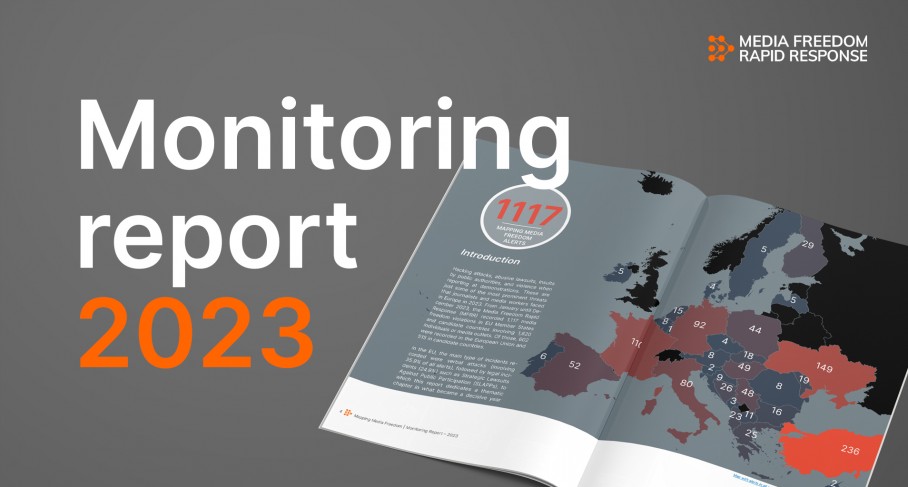The Media Freedom Rapid Response (MFRR) Monitoring Report 2023 documented a staggering 1,117 media freedom alerts over the past year. This joint report unveils the persistent threats faced by journalists and media entities across EU member states and candidate countries.
In a collaborative effort, the International Press Institute (IPI) and partner organisations from the Media Freedom Rapid response (MFRR) consortium present the latest Monitoring Report, shedding light on the state of media freedom from January to December 2023.
The report, co-written by IPI, the European Centre for Press and Media Freedom (ECPMF) and the European Federation of Journalists (EFJ), gathers and analyses all media freedom violations recorded on the Mapping Media Freedom platform.
Ongoing war in Ukraine
The report begins by delving into the impact of the ongoing conflict in Ukraine on press freedom. Throughout 2023, the MFRR recorded 149 alerts related to the war, highlighting the dire circumstances faced by 220 different media entities.
Spike in cyberattacks
Distributed Denial of Service (DDoS) cyberattacks emerged as a significant threat, with the number of cases doubling compared to the previous year. Hungary and other European countries witnessed 61 alerts targeting 112 individuals or media entities.
Populist assaults
A thematic chapter uncovers populist assaults on media freedom by public authorities and politicians, spanning from verbal harassment to legal intimidation and restrictive legislations such as ‘foreign agent’ laws.
Abusive lawsuits
The report shines a light on civil and criminal lawsuits targeting journalists and media outlets. In 2023, MFRR partners recorded 20 legal cases exhibiting characteristics of Strategic Lawsuits Against Public Participation (SLAPPs).
Country focus
The MFRR analysis also includes country reports, offering a summary of the most relevant threats in specific EU countries (France, the Netherlands, Italy, Hungary, Spain, Finland, and Slovakia) and candidate countries (Serbia, Albania, Bosnia and Herzegovina, and Turkey).
Key figures
- A total of 1,117 media freedom violations were documented across EU Member States and candidate countries, affecting 1,620 individuals or media outlets.
- Within the EU, private individuals constituted the largest source of attacks (nearly 33%), followed alarmingly by public officials (17.9%) and law enforcement agencies (12.6%).
- Tragically, three media workers lost their lives, with two fatalities in Ukraine and one in Albania.
- Ukraine witnessed 149 media freedom violations, indicating a slight increase compared to the previous year, highlighting the persistent challenges amid conflict.
- Physical attacks accounted for 20.6% of all incidents within the EU, while verbal attacks dominate the landscape at 35.9%.
- In EU candidate countries, legal incidents were predominant, comprising 29.7% of all alerts.
Going forward
As IPI joins forces with its partners to publish this comprehensive report, it underscores the MFRR consortium’s commitment to advocate for media freedom relentlessly. The challenges highlighted in the Monitoring Report 2023 serve as a clarion call for concerted action to safeguard the fundamental principles of press freedom, across Europe and beyond. IPI is proud of its collaboration with like-minded organisations, and reaffirms its dedication to advancing media freedom worldwide.
This report was coordinated as part of the Media Freedom Rapid Response (MFRR), a Europe-wide mechanism which tracks, monitors and responds to violations of press and media freedom in EU Member States, Candidate Countries, and Ukraine. The project is co-funded by the European Commission.




